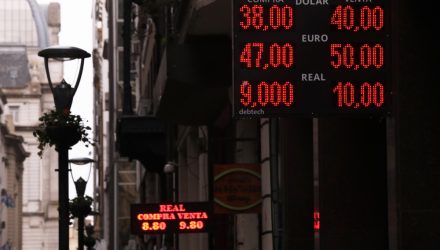Negative yields in certain parts of the world aren’t doing fixed income investors any favors, particularly when they want international diversification. However, it’s not swaying certain investors away from Argentina’s corporate bonds, which are garnering interest despite negative yields.
What’s making them so attractive? Per a Bloomberg article, the “quirks of its capital markets have turned the country into a surprising hot spot.”
“Argentine companies issued a record $596 million of dollar-linked bonds domestically in the past two months, and about a third now pay negative yields,” the article added. “Local investors are lapping them up, willing to accept losses in dollar terms because the notes’ peso payouts are adjusted to account for swings in the foreign exchange rate. Pessimistic forecasts call for the peso to drop as much as 50% within two years, generating returns for investors that dwarf any costs they have to incur from receiving negative yields.”
“The local market is valuing the need for a hedge against depreciation more than the credit risk of the issuer,” said Alejandro Haro, head of sales and private banking for Banco Comafi in Buenos Aires. “As long as its dollar-linked, it’s in demand.”
Investors looking to get Argentina exposure via exchange-traded funds (ETFs) can check out the Global X MSCI Argentina ETF (NYSEArca: ARGT). ARGT seeks to provide investment results that correspond generally to the price and yield performance, before fees and expenses, of the MSCI All Argentina 25/50 Index.
The fund invests at least 80% of its total assets in the securities of the underlying index and in American Depositary Receipts (“ADRs”) and Global Depositary Receipts (“GDRs”) based on the securities in the underlying index. The underlying index is designed to represent the performance of the broad Argentina equity universe while including a minimum number of constituents.
When looking for more broad exposure to emerging markets versus single country exposure, one fund to consider for broad-based emerging markets exposure, but with less volatility risk is the FlexShares Emerging Markets Quality Low Volatility Index Fund (QLVE). QLVE seeks investment results that correspond generally to the price and yield performance, before fees and expenses, of the Northern Trust Emerging Markets Quality Low Volatility IndexSM.
The underlying index is designed to reflect the performance of a selection of companies that, in aggregate, possess lower overall absolute volatility characteristics relative to a broad universe of securities domiciled in emerging market countries. Under normal circumstances, the fund will invest at least 80% of its total assets in the securities of the underlying index and in ADRs and GDRs based on the securities in the underlying index.
For more market trends, visit ETF Trends.


